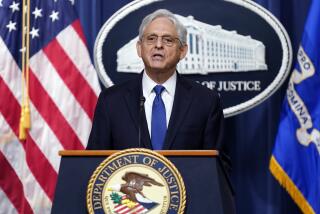Privilege has its limits
- Share via
WITH PRESIDENT BUSH invoking executive privilege to prevent former aides from testifying about the firings of eight U.S. attorneys, and congressional Democrats hinting at a cover-up, it seems naive to ask why the branches of government can’t just get along. Yet, even at this late date, it’s in the interest of both Bush and Congress to dismount their respective constitutional high horses.
To do so, they should embrace a compromise floated three months ago by Sens. Charles E. Schumer (D-N.Y.) and Arlen Specter (R-Pa.). Under the plan, present and former White House aides would testify for the record, but without having to swear an oath. That compromise would split the difference between the White House position that the aides be interviewed informally, with no transcript, and the enforcement of congressional subpoenas.
Admittedly, the two sides are still in a war of words. In a letter to the House and Senate judiciary committees, White House Counsel Fred F. Fielding sputtered that Congress doesn’t understand that “in order to fulfill his constitutional functions, the president needs the protection of a principle that shields his close advisors from open-ended inquiry by another branch of government.” Sen. Patrick J. Leahy (D-Vt.), the chairman of the Senate Judiciary Committee, lashed back by asking: “What is the White House hiding?”
Both sides are arguing from positions of weakness. For Congress, the problems are legal and practical. Just as the devil can quote Scripture, Bush can cite the Constitution as interpreted by the Supreme Court. The 1974 case of U.S. vs. Nixon is remembered mostly for its bottom line — that President Nixon had to surrender incriminating White House tape recordings to a special prosecutor. But in reaching that result, the court essentially held that the Watergate investigation was the exception that proved the rule.
Sounding like Fielding, then-Chief Justice Warren Burger wrote: “A president and those who assist him must be free to explore alternatives in the process of shaping policies and making decisions and to do so in a way many would be unwilling to express except privately. These are the considerations justifying a presumptive privilege for presidential communications [that is] inextricably rooted in the separation of powers under the Constitution.”
That’s not only the law, but also sensible. Presidents should be able to confide in aides and to solicit advice without it being made public. President Eisenhower memorably refused to allow associates to testify before the House Un-American Activities Committee during its run amok.
There are limits to that privacy, however, and that too is appropriate. Burger said that presumption must yield when presidential documents were the subject of a subpoena issued by a grand jury in a criminal investigation. But Congress’ investigation of the U.S. attorneys dismissals is likely to be viewed, especially by the current Supreme Court, as much less weighty.
So Congress has an incentive to compromise. But so does Bush. If he continues to thwart Congress’ investigation, Democrats will be tempted to demand that the Justice Department appoint a special counsel to probe whether at least some of the firings involved obstruction of justice.
The administration has insisted throughout this affair that no prosecutor was fired for doing his or her job, and even Sen. Sheldon Whitehouse (D-R.I.), one of the administration’s harshest critics, has acknowledged that “we have yet to find the smoking gun” of criminality. But this White House has a disturbing record of stonewalling, and if it continues in this instance, it can expect calls from Congress for the appointment of a special counsel who might have more luck — and who might succeed in persuading the courts to pierce the veil of presidential privilege. If Bush is wise, he won’t take that chance.
More to Read
A cure for the common opinion
Get thought-provoking perspectives with our weekly newsletter.
You may occasionally receive promotional content from the Los Angeles Times.









